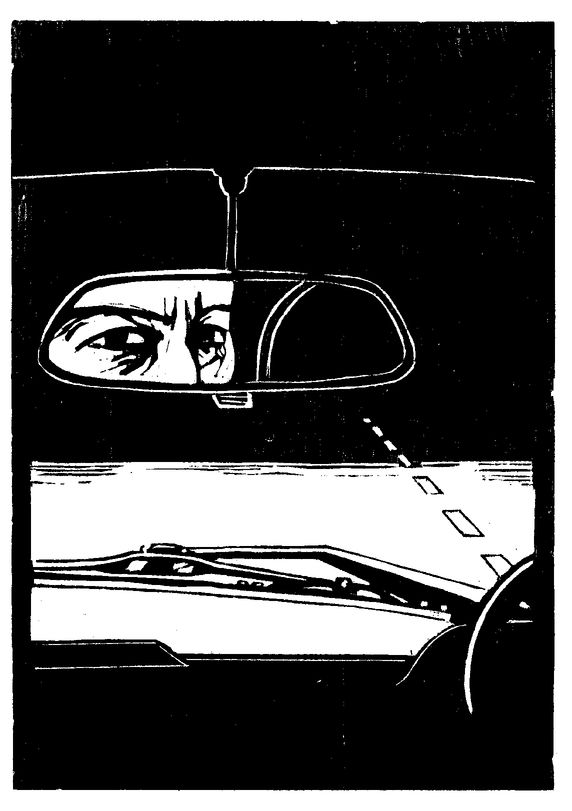9.
“You again.”
I opened my eyes and found myself gazing into someone else’s. In a rearview mirror, the eyes of the cabbie who had driven me back from the hospital.
“Yes,” I said. “Me again.”
“What are the chances of that happening? Picking you up twice.”
“Surprisingly high,” I said, relaxing into the back seat. “I must have stepped backwards.”
“Excuse me?”
“I said, I must have stepped backwards. From the roof.”
“What roof?”
“I nearly just jumped off the top of a building.”
“Life getting you down?”
“No.”
“What stopped you from jumping?”
“I don’t know. The wind wasn’t with me.”
The cabbie’s curiosity seemed to have passed. “So, where are we going?” he asked, businesslike.
I thought for a moment. “I’ll get back to you on that,” I said.
So passages from favorite pieces of music or literature were too incomplete to provide the waking trigger I was looking for. And if my encounters with Anthony or Mary or Catherine were anything to go by, then conversations with dream people were not going to do the trick either.
But if my memory could be relied upon to produce buildings with accuracy, then perhaps I still had an ace up my sleeve. Some buildings, or locations, were as evocative as music or conversations. And buildings could be explored. Rooms could lead to corridors that led to further rooms.
It was a question of finding the right building.
“Do you know where I went to school?” I said.
“I couldn’t guess,” the cabbie replied. “Give me a clue.”
I shook my head. “It’s not a guessing game. I’m asking you if you happen to know where I went to school.”
“Would I know a thing like that?”
“I just thought perhaps you might.”
He craned around in his seat to shoot me an incredulous look. “I’d have thought you might.”
“Yes,” I agreed. “But I don’t.”
“So, is it your old school you’re after?”
“Not necessarily. It was just the first place that came to mind. What I’m after is . . .” I paused. “A trip down memory lane.”
“Memory Lane . . . is that south of the river?”
“I was using a figure of speech.”
“And I was making a joke.”
When it became apparent that I wasn’t about to laugh, the cabbie cleared his throat. “If I was after a trip down memory lane, I’d want to go back to the house where I grew up.”
“Ah. That would be ideal.”
“So why don’t we head there?”
“I’d love to.”
I didn’t add anything more, such as the street address the cabbie was doubtless expecting.
Eventually, he said, “You don’t know where that is either.”
“No,” I said.
“So how do you expect us to find it?”
“I suppose . . .”
I suppose I was hoping that by mentioning the house I grew up in, or my old school, we would simply find ourselves there. It had happened that way with the hospital, and the record shop, and standing on the roof. Up to now, the relocations had been quite easy. Even helpful. But perhaps not anymore.
“. . . I was hoping for the best,” I finished.
“I think you have to do more than hope,” said the cabbie, and I wondered if he was chiding me.
“What do you suggest?”
“Well, I’m a cab driver. I drive around everywhere. Chances are, I’ve driven past the house where you grew up on more than one occasion. I’ve probably dropped off on that street. I probably know it well.”
“Okay . . .”
“If you could manage to describe something about the house or the area, there’s a good chance you might be able to tell me more than you think.”
“Describe the house . . .”
Yes—a sensible enough suggestion. But hopelessly let down by my amnesia, which at the moment was permitting me only the snapshot I had seen in the record shop—of a child’s perspective of a shadow father figure standing by a turntable that was out of sight.
The cabbie was waiting. I felt too embarrassed to say I couldn’t tell him anything useful, so I winged it.
“The house had a roof,” I said, then added, “obviously,” to show I was only getting started.
“Roof,” the cabbie noted seriously.
“And a front door. Walls and what have you.”
“Roof, front door, walls. With you so far.”
I tried to think of other features my house was likely to have had. I didn’t want to mislead him with false information, but I wasn’t sure what else I could confidently suggest.
“Windows?” the cabbie prompted.
“Yes,” I said quickly. “Several.”
“A front garden?”
A front garden.
I had a sudden flash, a sense of place. A sense of movement, backwards and forwards. Then falling.
“. . . A swing. Of course.”
“What?”
“A small front garden, with a tree and a swing.”
“Ah. So now we’re getting somewhere. Do you know how many houses have a front garden and a tree?”
“I don’t.”
“Fewer than most. So I think your house will be found in one of the more comfortable parts of town.”
I nodded. “I don’t recall discomfort.”
“There,” said the cabbie. “And I’ll tell you another thing. I would hazard a guess that the house was built after cars became commonplace. Because in the older houses, where the streets were widened, the front gardens disappeared. No—you grew up in a suburb.”
“You’re very good,” I said.
The cabbie’s eyes sparkled again. “I can picture the place already.”
“Yes,” I said. “So can I.”

